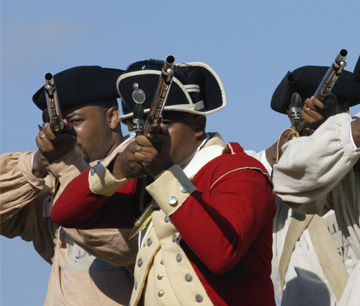American Revolution

In the spring of 1775, British soldiers and American militiamen exchanged the first shots of what would become the American Revolution. From then until a negotiated peace in 1783, both sides fought a military and political war that ended in the creation of a new United States of America. Among the many challenges that faced the American side was concern over the fate of slavery and enslaved people during and after the war. People of African descent played an important role in the war effort, serving with distinction on both sides. Ultimately, though, the war did not decisively resolve the issue of slavery in the United States—it would remain a difficult and factious problem until the mid-nineteenth-century.
Even before the United States declared its independence in the summer of 1776, slavery had become an issue in the war. In November of 1775 the royal governor of Virginia, the Earl of Dunmore, issued a proclamation in which he offered freedom to enslaved people who would support and fight for the British. Dunmore’s hope of a slave insurrection did not materialize, but about one to two thousand black Virginians fled to the British side. The fact that this occurred in Virginia—home then to the largest enslaved population in what would become the United States—highlights some of the challenges of slavery in Revolution-era America. The enslaved population was not evenly dispersed though the country. Roughly 20 percent of British North America’s 2.5 million residents in 1775 was enslaved. But nearly all of those half million people of African origin lived in the southern colonies. In New England, for example, less than 5 percent of the population was enslaved.
As people and policy-makers in the United States imagined the future of slavery, they were split down regional lines. Northern states generally saw slavery as peripheral to their daily lives; for Southerners, the institution was central. Across the country, the rhetoric of rights and freedom led to an increase in manumission by individuals. In the North, some states passed laws for immediate or gradual emancipation right after the revolution, with the balance doing so within a generation. In contrast, within the same span of time, the enslaved population of the South had increased because of renewed importation. This increase more than compensated for wartime declines in the slave population.
People of African descent embraced the spirit and logic of the revolution. Some petitioned state legislatures for individual or group manumission. Others sought freedom through military service. Many thousands of enslaved people chose not to rely on individual or state benevolence and undertook the brave and dangerous task of freeing themselves by running to the North, the frontier, or the British.
History & Memory
Related Pages:
-
 Schomburg Center for Research in Black Culture
Schomburg Center for Research in Black Culture
-
 Gowan Pamphlet
Gowan Pamphlet
-
 The Colonial Williamsburg Foundation
The Colonial Williamsburg Foundation
-
 Louisiana
Louisiana
-
 Lydia Broadnax
Lydia Broadnax

